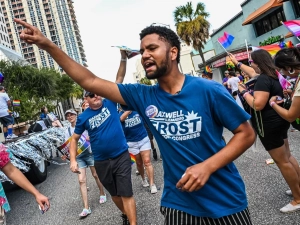 Gen Z turnout may have stopped a ‘red wave.
Gen Z turnout may have stopped a ‘red wave.
Young voters say they were underestimated.
By Barbara Heimlich
Editor
Sources: March For Our Lives; Center for Information and Research on Civic Learning and Engagement at Tufts University; CIRCLE; Philadelphia Inquirer; NPR.
“I don’t think older generations realize how fundamentally angry we are,” said Maddie Billet, 20, a sophomore at George Washington University and Bucks County native who voted Democratic. “We’re angry with policies and practices that have set up our lives to be a struggle from day one. We were born into a world where the environment is crumbling, democracy is dying, bigotry is becoming the norm, and we’re angry about it.”
“They [older generations] think we are turned off by politics. In reality, we are just done with the way our government is being run.” Kaleb Purswell, 19. He said key issues that inspired him to vote for the first time included LGBTQ rights and women’s rights.
Despite pundits and polls predicting a red wave, Democrats had one of the best midterms in over 50 years due to high youth turnout. Estimates say that about 27% of people ages 18 to 29 — Zoomers and those on the Gen Z-Millennial cusp — cast ballots this November, according to the Center for Information and Research on Civic Learning and Engagement at Tufts.
In midterm general elections dating back to the 1990s, turnout among the same age group has hovered around 20%. CIRCLE said its estimates place young voter turnout at its second-highest since the 1990s, below only 2018′s 31%.
Exit polls show that among the 27% of young voters who cast ballots in midterms, nearly 63% voted for Democratic candidates. In critical races in Michigan, Pennsylvania, Wisconsin, and New Hampshire, Gen-Z voters broke significantly in favor of Democrats, delivering the margin of victory in tight races for Governor and the Senate.
The first Gen-Z champion, former March For Our Lives National Organizing Director Maxwell Frost, was elected to Congress along with five gun safety candidates who received high scores from March For Our Lives, all of whom won their elections. Maxwell Alejandro Frost is the first member of Gen Z elected into Congress. The 25-year-old Democrat will represent Florida’s 10th Congressional District, and becomes the youngest person elected to serve in the United States Congress.
When Frost takes office in January, he’ll join a Congress known for lacking diversity in age – given the current membership is the oldest in U.S. history.
In Oregon, despite being outspent by the gun lobby, Measure 114 won to deliver a significant step forward in the fight for gun safety — requiring safety training and a criminal background check to purchase a firearm, and prohibiting high-capacity magazines.
The data is still coming in nationally, but from what we know, Gen Z-ers sustained their record-breaking 2018 turnout during the 2022 midterm elections, opting for Democratic House candidates by 25 points and limiting Republican gains. Voters under the age of 29 broke for Democrats and helped many win in battleground states. In the high-stakes Pennsylvania Senate race, which Democrats flipped by a three-point margin, Gen Z-ers supported John Fetterman by a 46-point margin and increased their share of the electorate from 2018. This all goes to show one central point: When young people’s rights are on the ballot and championed by the candidate, they show up.
No official sources of demographic voter data are immediately available after elections. CIRCLE bases its numbers on exit polls. Figures like Harvard University’s Cooperative Election Study, Pew surveys, and Census Bureau voting data will only drop in the coming months.
Experts say that young people’s tenacity may have been the difference between Republicans’ promised “red wave” and the actual midterm results, which saw Democrats losing fewer U.S. House seats than expected and even flipping Pennsylvania’s Senate seat blue.
Young people overwhelmingly backed Democrats for U.S. House and Senate races. Gen Z’s support of Democratic candidates including incumbent Govs. Gretchen Whitmer in Michigan and Tony Evers in Wisconsin, and Sen.-elect John Fetterman over Mehmet Oz in Pennsylvania proved to be critical, the data shows.
In Pennsylvania, Gen Zers and younger Millennials backed Fetterman over Oz, 70% to 28%.
“My representative and Senate races were most important to me. My representative has been Brian Fitzpatrick for what feels like forever,” she said. Fitzpatrick, a Republican who won reelection this year, was first elected to Congress in 2017, when Billet was 15. “I really wanted his seat to flip blue. I also really enjoy everything John Fetterman stands for and he’s the embodiment of an average Pennsylvanian.” Billet was one of Fetterman’s supporters.
For young people like Sophia Shapiro, it’s personal. Shapiro is Pennsylvania Governor .-elect Josh Shapiro’s college-age daughter. She founded and runs Students for Shapiro, a student-led group that rallied local high school and college students around the gubernatorial candidate. She says the group had over 50 school chapters and nearly 1,000 members. The group met young people where they were, mobilizing on social media — including platforms most popular among Gen Z like Instagram, TikTok, and BeReal — to connect with their base.
A recent poll by Campus Vote Project showed that college students’ top source for information was social media. Candidates like Fetterman were active on TikTok throughout the election cycle and on the campaign trail.
Olivia Juliana, director of politics and government affairs for the youth-led nonprofit group Gen Z for Change, said Frost’s election and rising youth voter turnout means Gen Z now has “a seat at the table.”
For months, groups like Voters of Tomorrow — a voter engagement and education organization run by Gen Z-aged leaders — have been rallying young people to get engaged and hosting text banks and an online voting hub.
Thomas Quinn with PA Youth Vote said the group has spent the last few years working with teachers, students, and other groups to teach them about the voting process.
“Young people need fair resources and real conversations to judge the candidates, and not just negative TV ads,” Quinn said, pointing to a statewide PA Youth Vote Mock Election that let students interview local candidates. Quinn said youth took notice of which candidates engaged with them. “Kids are smart, and they can see through the glittering generalities,” he said. “They respond to candidates that take them seriously.”
Lydia McFarlane, 20, a junior at Villanova University, said she and her peers helped students register to vote, organized shuttle services to take students to the polls, and passed out “I Voted” stickers and buttons. “I definitely do think the impact of the youth vote was underestimated,” she said. “The college students [at my school] were very passionate about this election and went out to the polls in droves for the issues that were important to them.”
“For too long we’ve been cast aside in the political process,” said Victor Shi, a youth voting advocate. “We’ve been ignored. Our rights and identities have been attacked. But despite all this and more, young people shocked the nation by breaking turnout records and preventing a red wave.”
Key topics that drove Gen X and Gen Zers to the polls included preserving abortion access, legalizing marijuana, voter rights, raising the minimum wage, LGBTQ rights, and gun safety.
Gun control continues to be a top issue among younger voters. According to recent polling from Harvard Institute of Politics, 22% of respondents said it was either their most important or second most important issue – compared to inflation (45%,) abortion (33%) and “protecting democracy” (30%).
What Next? Get Active.
NextGen America, a youth voting organization. NextGen America is a progressive advocacy nonprofit and political action committee created in 2013 by billionaire hedge fund manager Tom Steyer. The group mobilizes young voters on issues including climate, health care, reproductive freedom, immigration, and equality.
Run for Something, an organization that supports young people running for state and local office. https://runforsomething.net/
Campus Vote Project, https://www.campusvoteproject.org/stateguides/Connecticut
Gen Z for Change, a nonprofit organization leveraging social media to promote civil discourse and political action among our generation. Partnering with influencers, activists, and celebrities, we produce multimedia content on a variety of topics including COVID-19, climate change, systemic inequity, foreign policy, voting rights, and LGBTQIA+ issues. They can be found on TikToc, Twitter, and YouTube.
Voters of Tomorrow — a voter engagement and education organization run by Gen Z-aged leaders. https://votersoftomorrow.org/about-us/

